One never notices what has been done; One can only see what remains to be done.
~ Marie Curie
slip:4a585.
One never notices what has been done; One can only see what remains to be done.
~ Marie Curie
slip:4a585.
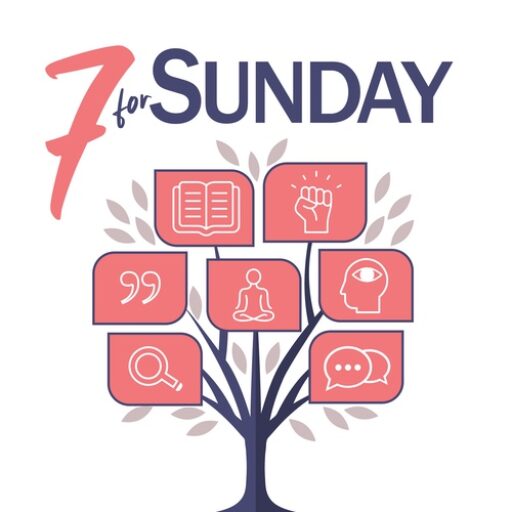
Reading my previous journal entries (as I do every morning) I was surprised to find it’s been only a year since I move my 7 for Sunday weekly email off to its own site. (If you like reading my blog posts, you’ll love reading my weekly email. ;)
It was quite a lot of work, although I’d completely forgotten all about it. What a gift it was to my today-self; yes, the work to move the project making it even better, but more so the delight of being reminded to look back and appreciate the project now.
ɕ
Benevolence and self-direction (described below) are usually near the top of the values we all share. Each of us also has an internal hierarchy of values, where we rank our values based on those we find extremely important to those that don’t really motivate us at all.
~ Chris Bailey, from There are just 10 basic values
slip:4ucite3.
Benevolence—in my opinion—only pops up on our radar once we have enough time, energy and resources. Whether or not it’s clear in that moment, that’s because we, for the first time, manage an honest look back and actually realize all the places where we’ve received help from others. So that’s nice for ourselves, but also for the entire human race.
ɕ
I wish when I was younger I knew what I know today, what I feel like today, a kind of ease with myself. Because when you’re younger you are much more intense and everything’s much more important and you look back and you think, “Oh what was that all about?” Nothing is that important, just live your life because we’re here so briefly.
~ Anthony Hopkins, from Anthony Hopkins
slip:4uteie16.
Oh good, it’s not just me who thinks this. Because, if I could take that knowledge with me, I’d really like to again be the age I was, when I thought I’d surely have my shit together by the time I was the age I am now.
ɕ
Perspective is endlessly fascinating to me. What is it like to look back on decades of one’s own efforts? What’s it like to look back on one’s efforts if they’ve shifted the world?
Three and a half decades ago, when I invented the web […]
~ Tim Berners-Lee from, Marking the Web’s 35th Birthday: An Open Letter – World Wide Web Foundation
slip:4uwema1.
Well, that’s an ‘I’ statement with a little punch.
ɕ
These stories illustrate two truths. 1) I’m a big ol’ nerd, and 2) the goodness and badness of memories fade over time, but the badness fades faster—that’s the fading affect bias. Some bad memories even become good memories, while good memories rarely become bad memories.
~ Adam Mastroianni from, Underrated ideas in psychology – by Adam Mastroianni
slip:4ueepu1.
Like Mastroianni, I’m clearly susceptible to this bias. One thing that I use to fight it, is to write myself honest thoughts after things happen. A lot of the pleasure from something is the anticipation—the imagining of the enjoyment from some expected experience. That’s pretty easy to remember to journal and it happens without effort in the days leading up. But after the fact, I usually take a big chunk of time and decompress. What did I really think when I got hit in the head that one time at that thing? …or when I fell? …or got sick? The best adventures are when I look back and think: “ugh, that sucked. I’m glad I did it.”
ɕ
My life is always better when I treat myself as if I were someone I care about.
~ Hugh Hollowell from, «https://www.soverybeautiful.org/how-we-treat-ourselves/»
I’m really good at digging in and schlepping through the hard work. I’m really good at figuring out how to make three strange pieces fit together so these four people can make some progress on those five incompatible goals. Lift heavy things. Break a sweat. Get shit done. Go above and beyond. Get this letter to Garcia. Abuse English.
Know what I suck at? Treating myself as if I were someone I care about. Can I say, “no, thank you,” to some opportunity because I’m already overwhelmed? Can I take a nap in my hammock, without first spending significant time weighing the merits of giving in to passing out from exhaustion, versus just. work. a little. more. Can I choose to go do that fun thing with my friends, when my weekly plan says I should get some peak heart-rate workout time today? I’m often heard preaching about self-care, taking time to look back and think, “if this isn’t nice…” but, can I actually do those things?
ɕ
Such as are your habitual thoughts, such also will be the character of your mind.
~ Marcus Aurelius
slip:4a185.
I have a series of prompts which are a combination of quotes and small notes I’ve written for myself. I’ve mentioned this a few times in various posts tagged Reflection. As I collect them—pretty rare these days—I record them on slips in the slipbox. In 2019 I posted Daily Reminders describing what I was doing and listed the 42 prompts. Below you will find the current list of 62.
Over the years I’ve taken the time to type them into OmniFocus, the personal productivity software which I use. I carefully created individual “to-dos” for each one, with each scheduled to repeat at just the right number of days, and lined up their initial due dates. Many years later now, every day, one of them comes up digitally as a reflection prompt. While I recognize everyone of them, there are enough of them that I cannot remember which one will be next.
ɕ
What we miss about our own beloved Good Old Days isn’t so much the material things they remind us of—wholesome 1980s sitcoms, or musty thrift-store sweaters—it’s the particular feelings those days gave us, feelings which are now impossible to experience.
slip:4urate16.
Cain rightly goes on to point out, that while we can’t feel those exact feelings again, there’s no reason we can’t—right this very instant—enjoy These Good Days. Ten years from now—presuming, of course—I can look back and think with a chuckle: Remember when I spent a couple years going really deep experimenting with knowledge systems. That was a fun exploration.
ɕ
Let me be clear that no part of me idealizes the bygone agony of waiting three weeks for a letter from your lover to cross the Atlantic—a letter that might never arrive from a lover who might be dead by the time it does arrive. But let me also be clear that, in another century or two, if humanity is wise enough to survive and reconsider its compulsions, posterity will look back on us gobsmacked that we put ourselves through the agony of the three pulsating dots.
slip:4a951.
Because we can look back and see that the way time has been measured throughout history has changed, it’s reasonable to imagine when looking forward that it will continue to change – our current use of hours, minutes, weeks and months may be as obscure and forgotten as the nundina, the akhet, or the gesh several millennia from now. The day, the year, and the movements of the other planets in our solar system, on the other hand, aren’t at the whim of the powers that be or of passing cultural trends. The 10,000 Year Clock, therefore, keeps track of these robust and durable units of time. The Clock’s main dial keeps track of the Sun, Moon and stars while The Orrery models our solar system.
~ Austin Brown from, Long Now’s Orrery Prototype For The 10,000 Year Clock – Long Now
slip:4ulooe1.
Immediately before reading the above article, I read something about the eastern Sahara Desert. About a researcher who managed to extract a 50-foot core-sample from a lake bed spanning 11,000 years of seasons. What is now a desert was once a lush paradise.
The projects and updates from the Long Now Foundation always fill me with awe and wonder. They always make me try to imagine 10,000 years from now. And that makes me feel like a slightly better person for having spent some time trying to think bigger-than-myself. But that core sample? …it covered still more. 10,000 years is but a blink in geologic time.
ɕ
How can podcasting serve as an effective tool for active learning and decentralizing power dynamics in the classroom?
Experimenting with podcasting helps students move from passive listeners to active creators.
They always get surprised at the end that, even as painful as it is in the process, you can look back and be like, ‘I knew nothing about any of this and now look what we’ve created.’
~ Nicole Colter (19:36)
The conversation explores the innovative use of podcasting as a tool for active learning in higher education, particularly in a management class. Nicole explains how podcasting helps decentralize classroom power dynamics, allowing students to collaborate, manage projects, and co-create learning experiences. By recording interviews with textbook authors, students engage in active learning while gaining communication and organizational skills.
Nicole highlights the broader learning benefits of podcasting, such as fostering creativity, confidence, and reflective listening. She shares how students begin to see themselves as creators and take initiative beyond assigned tasks. Topics discussed include decentralized pedagogy, alternative assessment methods like “ungrading,” and the value of indirect learning outcomes. Nicole also reflects on challenges such as students’ initial struggles with conversation and project management, ultimately noting their surprise and pride in their final accomplishments.
Takeaways
Active learning through podcasting — Students engage deeply by creating content and interviewing experts.
Decentralized power dynamics — The course empowers students to manage their learning experience collaboratively.
Indirect learning outcomes — Podcasting facilitates valuable skills beyond stated course objectives, like communication and confidence.
Overcoming communication struggles — Students learn and practice the art of meaningful conversations.
The role of reflection — Listening to their own recordings helps students critically evaluate and improve their communication.
Project-based education — Podcasting replaces traditional tests with real-world, outcome-driven projects.
Encouraging creativity — Students begin to see themselves as capable creators, even outside assigned tasks.
Experimentation and adaptability — Nicole views each semester as an opportunity to refine processes based on reflections and feedback.
Practical management skills — Students apply concepts like planning, organizing, and leading through collaborative projects.
The value of open resources — Projects like interviewing textbook authors create accessible learning materials for others.
Resources
The Last Lecture — Randy Pausch’s book referenced for the concept of “head fake” learning, which emphasizes indirect learning outcomes.
(Written with help from Chat-GPT.)
ɕ
Meditation is intermittent fasting for the mind. Too much sugar leads to a heavy body, and too many distractions lead to a heavy mind. Time spent undistracted and alone, in self-examination, journaling, meditation, resolves the unresolved and takes us from mentally fat to fit.
Today’s message is not really a prompt like the previous 60. Alas, we’ve reached the terminus of our journey of small steps practicing reflection.
Thank you for being awesome!
I created this series by taking my personal collection of self-reflection prompts and forming them into these blog posts. Next, I wrote the three getting-started posts to ease you into the daily routine. Finally, I came up with a theme for each of the 8 weeks and wrote short additions that appeared below the main sequence of prompts. These additions carry the through-line of teaching self-reflection. (…or at least, I hope they did.)
Here are all the additional parts in one place:
Remember: 2 minutes. Pause life. Read. Think. Resume life.
Many of the prompts I’m sharing have been chosen from the generous gifts given me by others. When I’m explicitly quoting, they are attributed (as above.)
2 minutes: Pause life. Read. Think. Resume life.
Perhaps you’ve already begun to look forward to your two minutes of reflection?
2 minutes: Pause life. Read. Think. Resume life.
Have you considered adding some physical ritual to your reflection? Perhaps taking three deep, slow breaths before the reading, or … If you decide to try something, don’t go crazy; just something very small and easy. Or not. That’s fine too.
2 minutes: Pause life. Read. Think. Resume life.
Everything you do is initiated by triggers. “X” happens to me, so then I do “Y.” Creating a new habit is difficult because we don’t realize we need to attach it to a trigger.
Trigger. New habit.
You’re using the arrival of this email as your trigger. Do you recall that I mentioned on day one that I was introducing you to being reflective upon being prompted?
Trigger. New habit.
Today’s a good day to look closely at the trigger you’re experiencing. There are always ways you can change a trigger. Tinker—if not for real, then at least as a thought experiment—with changing the daily trigger for this journey.
Trigger. New habit.
One day, these triggers from me will end. To what trigger under your control could you attach this nascent habit of self-reflection?
Reflection is about self-focus. Each day you’re practicing holding up a mirror. Specifically, you’re observing your thoughts, in response to a prompt.
It’s not necessary to move beyond simply observing our thoughts. Simply practicing _observing_ your thoughts will make you more aware of your thoughts.
Our practice of reflection is an explicitly inward-facing activity. We’re repeatedly, intentionally being aware.
Reflection. Inward-facing. Intentional awareness of our own thoughts.
A good mirror shows an accurate image. A fun-house mirror shows a distorted image. How is your reflection on your own thoughts?
Having now spent at least 46 minutes in self-reflection and practicing awareness of your own thoughts— …any change in daily lived life? …any change in your relationships? No right answers, simply awareness.
Are you surprised by your thoughts’, and your mind’s, complexity? Are you amazed? Are you empowered?
We’ve been developing our awareness via self-reflection. What happens if we turn our awareness outward?
Were there any moments yesterday when you suddenly—it can be quite jarring the first few times—became aware that you were _aware_ of your own thoughts?
You are using a trigger to practice reflection. Is there anything in your day that resembles the reflection trigger? Opportunities where you could reflect spontaneously?
We’re about halfway. Poke your head out of your private journey of practicing reflection and quietly take some guesses about how reflective are the people around you. No judging; recall day one’s message about self-improvement not being zero-sum.
If you encountered even one moment yesterday where you realized someone else could be more reflective: Visualize that moment you experienced… and imagine slowly raising a hand mirror into that perspective—so you see your own reflection appear on top of that person.
Are there moments in your day when you realize you are aware that you are observing something outside yourself? If so— If you are aware you are observing, can you use that as a trigger to look inward and reflect on your own thinking?
Awareness of our inward experience, and our outward experience, is the same. It’s the same awareness. These past few days, we’ve taken our awareness on a brief field trip outside ourselves. For the rest of our little journey here, we’ll remain looking inward.
How good is your memory? What’s the first food you had after waking eleven days ago? Perhaps, your memory isn’t _that_ good. How about something you are currently interested in: 11 days ago, did you have any insights from your morning reflection?
Everything about this journey is, of course, optional. But I want you to find paper and pencil/pen. Don’t over-think that, and don’t try to use something digital. Grab any paper and any pen, and have them handy for tomorrow’s reflection.
Remember that paper? Write the first thought that comes to mind, when I say, write the first thought that comes to mind. You’re done.
Today, write the first and second thought. It really, truly, does not matter what the thoughts are. Please try writing them down. Put the paper away until tomorrow.
I’m not even asking that look back at what you’ve written. Simply write a couple thoughts, (or more than a couple, if you wish.)
And write _several_ thoughts down today…
Now look back through your week of notes. Maybe write a few notes about your observations of your notes? Maybe, you want to look more into journaling? (Today is the last time I’ll mention journaling in our journey, but I highly recommend continuing.)
You’ve put a lot of effort so far into practicing reflection. It’s important that we don’t lose the trees for the forest. The focus of daily reflection is the _tree_; the forest will take care of itself.
One can bring self-judgement into reflection practice, but it is not necessary. Simply practicing being aware will pay dividends. I’m recommending you do the reflection without the judgement.
A human being. Not a human doing.
My martial arts teacher, Sensei Wirth, turned the phrase: No this. No that. No delay.
Many arts teach the lesson of simply being. Zen, for example provide koans: “What is the sound of one hand clapping?”
Different styles of Yoga teach variosly about sound, light, and breathing.
The sublime experiences of life can be found anywhere. I’m hoping you find it within this small space you’ve created for reflection.
My intention for this series is to bootstrap your practice of reflection. For me to have suceeded, you must end up being self-sustaining in your practice.
The skeleton of this journey is the 57 prompts which appear at the top of each of these posts. I wasn’t born with those. What will be your prompt, or prompts?
How are you going to continue to trigger yourself to do your morning reflection?
I like to read, and daily-study/daily-devotional books is an entire Genre. But there are also web sites, software, flip cards, … what calls to you?
The best choice for medium and method—for prompts, for journaling, for reflection—is whatever reliably triggers you to reflect. Make it yours; change it whenever you wish.
Do you recall the beginning of this journey? While I created the prompts and the system which you are now enjoying, how will you continue it yourself?
It’s time for the student to become the teacher. What prompts and triggers are you going to create for yourself as you go through your life being your own teacher?
We’re in our final week together. The first week was about creating space. 2 minutes: Pause life. Read. Think. Resume life.
Our second week was focused on creating a new habit. Do you have your new habit attached to a trigger?
Week three was about the practice itself of reflection; becoming aware explicitly that we are— well, practicing being aware.
Awareness occupied our practice during our fourth week. Inward. Outward. Simply being aware is awesome.
In week five we tried the tiniest taste of capturing our thoughts. Reflection is a power tool for self-improvement. Journaling—and there are many kinds—is another.
Simply being is easy to understand but difficult to embody. In week six I tried to point at the moon, while hoping my pointing finger didn’t draw your attention instead.
Last week we began looking beyond this small, introductory journey and talking about ways you could continue on your own.
When will the rhetorical questions end?
ɕ
As a PDF — You can download Practicing Reflection as a single e-book.
LOOK BACK — Look back at some of the things you’ve accomplished or experienced and think… — “Well if that isn’t nice, I don’t know what is.” ~ Kurt Vonnegut — “One never notices what has been done; One can only see what remains to be done.” ~ Marie Curie
One day, tomorrow in fact, there won’t be any more of these prompts. But having read this far, I hope you’ll believe me when I say: You’ll like tomorrow’s post too.
ɕ
Arrived in the middle? Visit the first post, Where to begin?
(The entire series is available to download as a PDF ebook.)
MY OATH — Today is the first day of the rest of my life. I shall make no excuses and hold no grudges. I care not where I came from, only where I am going. I don’t compare myself to others, only to myself from yesterday. I shall not brag about successes nor complain about my struggles, but share my experiences and help my fellows. I know I impact those around me with my actions, and so I must move forward, every day. I acknowledge fear, doubt, and despair, but I do not let them defeat me.
Now look back through your week of notes. Maybe write a few notes about your observations of your notes? Maybe, you want to look more into journaling? (Today is the last time I’ll mention journaling in our journey, but I highly recommend continuing.)
ɕ
Arrived in the middle? Visit the first post, Where to begin?
(The entire series is available to download as a PDF ebook.)
MUCH ABIDES —
Tho’ much is taken, much abides; And tho’
we are not now that strength which in old days
moved Earth and Heaven, that which we are, we are;
one equal temper of heroic hearts,
made weak by time and fate, but strong in will
to strive, to seek, to find, and not to yield.
~ Alfred Lord Tennyson
I’m not even asking that look back at what you’ve written. Simply write a couple thoughts, (or more than a couple, if you wish.)
ɕ
Arrived in the middle? Visit the first post, Where to begin?
(The entire series is available to download as a PDF ebook.)
I’ve started thinking about a touch phrase for 2021. (2020’s was the superbly helpful, “Get less done.”) As part of the thinking, I was browsing the old blog, and wondered when I last missed a daily post. That turns out to be November 18, 2019. It’s simply a random day with nothing posted.
For a few weeks leading up to that 18th, there’s a post on each day. But October of 2019 is Swiss cheese—actually, it’s more hole than cheese. But early to mid 2019 things look mostly solidly-posted. ¯\_(ツ)_/¯ I also know that in the very beginning of this blog I wasn’t even intending to post daily; In the beginning it was just a place for me to put things that I felt I needed some place to put. Unsurprisingly, character by character this blog was built like a drifting sand dune. In 2021 this blog will turn 10. Hello World was posted on August 13, 2011. If I continue, and I see no reason to stop, post number 3,000 should appear in late December 2021.
I bring this up because this time of year is traditionally a time for wrapping things up, and striking out anew, perhaps with a fresh start or a new commitment, into the new year. meh. That never works for me. But you know what has been working well—year-round, not just during this completely arbitrary calendar roll-over point—
LOOK BACK!
Look back at some of the things you’ve accomplished or experienced and think: “Well if that isn’t nice, I don’t know what is.” Seriously. I’m not going to end this post on a, “but if you don’t like what you see…”. No.
Take some time during the arbitrary end-of-the-year machinations to look back and think:
Well if that isn’t nice, I don’t know what is.
ɕ
Today, a deep dive into how slips get added to the Slipbox. I’ve been working on the Slipbox the last few days—I cannot wait to look back on these posts and the Slipbox in another decade. :) But mostly it’s been meta work: Deciding on format for the slips, and beginning to sketch out the conceptual superstructure of the Slipbox, … tedious and boring and the sort of process and organization work which I flippin’ love. *ahem* What follows here is a story, with photos. I’m going to go through adding three new slips to the Slipbox.
I was reading this book (image below) and I came to the section in the lower right. I thought that was interesting. The underlined bit in particular is a really great sentence about Stoicism. (I’ll get to the actual sentence in a moment.)
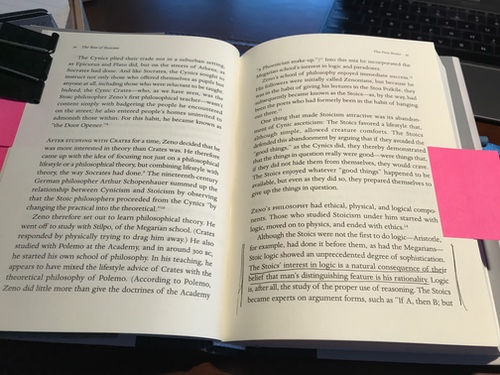
You might be wondering how I manage to make books lie open so neatly. There’s a clever hack (image below) for that. See also, Book holder for paperbacks. I’ve graduated from using a pencil, as I describe in the Life Hack linked, to using these gorgeous steel rods I found. Furthermore, because I’m insane, I used heat-shrink tubing in a lovely shade of blue to cover the ends so they don’t mark up tables and such.
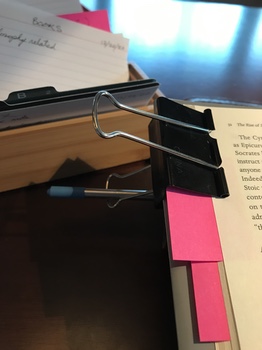
Back to that sentence which caught my eye as I was reading.
I grabbed a blank 3×5 card—what I’m using for the “slips” in my Slipbox—and I copied the bit I want from the book. (image below) I did not write that “5a1” at the top initially; After I did a lot more of what I describe in this post, it occurred to me to write this post, and I didn’t feel like rewriting this slip to take a photo without the “5a1”.
This slip has the bit I wanted to capture, then the page number, and the “(2a1)” is a slip reference; it’s the address of this particular book’s slip in the Slipbox. These things don’t have to be in any particular layout. They are all obvious in the context. What page number could I possibly mean, other than page 33 in the book itself? What could possibly be a (2a1) in the Slipbox—a book, but I could also just go look at (2a1).

All our books have a note in the front (image below) which say “LT” and which has the major Dewey Decimal System number. I’ll let it settle in, the level of commitment it takes to have done this for every book in the house. But it’s easy to maintain, just do it for each new book as they arrive. The “LT” is a reference to Library Thing, which is a magical web site that tracks library contents. In LT I know every book I’ve ever owned, which are currently in the house, I have a wishlist, etc..—going to a bookstore is magical when armed with that knowledge.
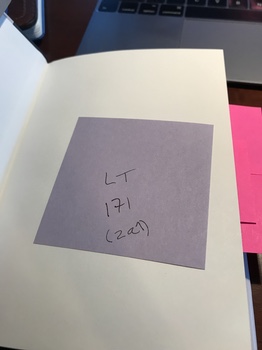
I may as well mention that the Dewey number is on the spine too. (image below) Yes, on every book. Yes, the books in the house are also shelved by Dewey Decimal. I learned a lot about what librarians actually do when I tried to find the Dewey Decimal number for a book—hint, it’s an art, not a science.
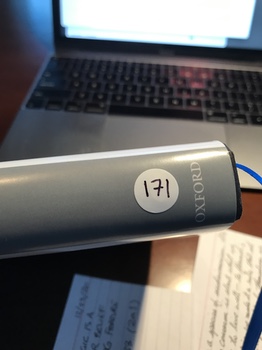
So it’s easy to figure out that the book I’m quoting from on this new slip is in the Slipbox at (2a1) because it’s on the postit in the book. I jot that on the slip, “this is where I got this from: Page 33 from the book at slip 2a1.”
Ok, I’ve capture that little quote. Where do I put this new slip in the Slipbox? Well, I think it’s a great idea about Stoicism, and Stoicism is in the Slipbox already. Below is a photo of the slip whose address is (5)—that’s the “5” at the top left. This is an “early days” slip so it has a silly-short address. This slip is just a list of topics I have under “Philosophy,” today just the “a” section for Stoicism. There is a boring “5a” too (not shown.) This seems silly, until I get to “g” under Philosophy, and that slip is 200 slips farther along in the box. Then I’ll be flipping through looking for that “silly” (5g) slip.

So (5a) already exists, and it is the home of “Stoicism” in my Slipbox. So where do I put my newest slip with this little quote from book (2a1)? I flip to (5a) and realize there’s nothing after it. So this new slip becomes (5a1). I wrote that (5a1) on there dead-last. And then I tossed it into the Slipbox behind (5a).
I did all that stuff to make that new (5a1) slip, and then I went back to reading the book. A few pages later I find this…

I scribble on the margin (above) since this is interesting. There’s a tiny “16” there. I look at this book’s notes—the book I’m reading in the photo—and it’s a reference to a book I actually have. (There’s also a tiny “17,” but it’s not a book I have.) I grab the referenced book and find the referenced page, starts lower-left (image below)… (I’d love to say the Dewey shelving was handy, but I am also reading this book! So it was sitting close at hand already.)

I had started reading this book before I had a Slipbox. When I looked at it today though, I realized that I’d have captured this exact bit… if I’d had a Slipbox.
Not shown: I made a (2a2) in for this book. Looks much like the (2a1) image above. I added (2a2) to the note in the front of the book.
Then I made a new slip (image below) for this bit about Stoicism… (I also added “pg 20” after taking this photo.) The note in the front of the book says “LT 171 (2a2)”—but I just made (2a2) anyway.
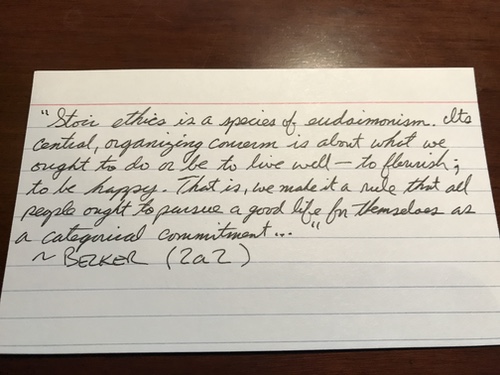
The cool part about this is the slip can lay around if I feel like having it close by. It’s a thought, and I know where I got the thought. When (if!) I want to put it into the Slipbox…
I flip to (5a) for Stoicism… there’s a (5a1) already, so this slip becomes (5a2). I add “5a2” to the top of the slip, I date the slip (the dates are “when it was added” to the Slipbox, not “when I wrote it”,) and toss it in the Slipbox.
A Guide to the Good Life by WB Irvine is the first book, way above. That’s the one I was reading this morning that started all of this. The next image is (2a1), the slip I created for this book.
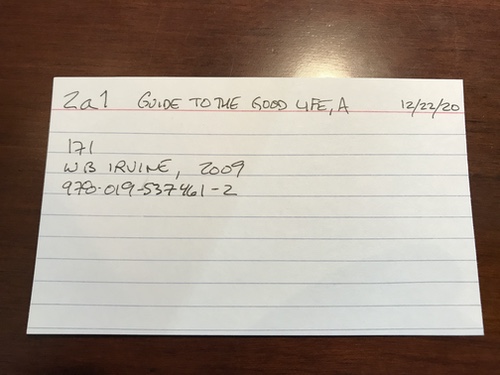
Don’t panic. I’m not adding a slip for every book. This isn’t a card catalog for the entire library. This slip got added to create a home for the next card…
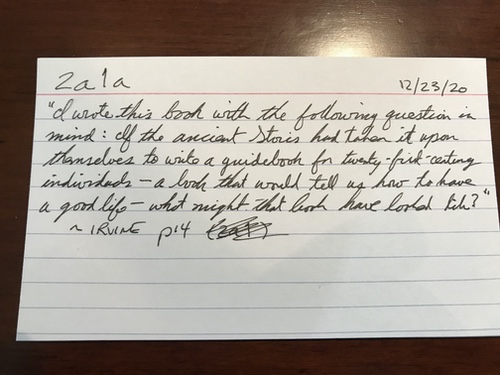
I have a feeling that this book is going to be referred to often. (Often enough to warrant adding it to the Slipbox.) Now, as I find (2a1)—aka references in the Slipbox to this book—when I flip to (2a1), I immediately see (2a1a) which tells me what the book is about. Or least what Irvine hopes the book is about. :)
ɕ
The days of our present come one by one, and each day minute by minute; but all the days of the past will appear at your bidding and allow you to examine them and linger over them at your will. Busy men have no time for this. Excursions into all the parts of its past are the privilege of a serene and untroubled mind; but the minds of the preoccupied cannot turn or look back, as if constricted by a yoke. And so their life vanishes into an abyss.
~ Seneca
slip:4a400.
In 1784, before Tennessee’s slender shape had ever been imagined and drawn on a map, there were rumblings of discontent in three counties in western North Carolina : Washington, Sullivan, and Greene. These small counties were isolated from the rest of North Carolina and their governing representatives, separated by the formidable Southern Appalachian mountain range. Residents were all too aware of how the mountains they lived in and around disenfranchised their lives.
~ Madelyn Brown from, A Look Back at Franklin, America’s Lost State
slip:4uaaai4.
Today, from the wait-wat?! department: There was almost-sort-of a fourteenth original state—except the Continental Congress never recognized it. Oh, geo-politics are complicated. *wry smile*
More seriously, Atlas Obscura is a terrific web site ticking off an endless list of amazing, surprising or simply interesting places on this magnificent marble we call home.
ɕ